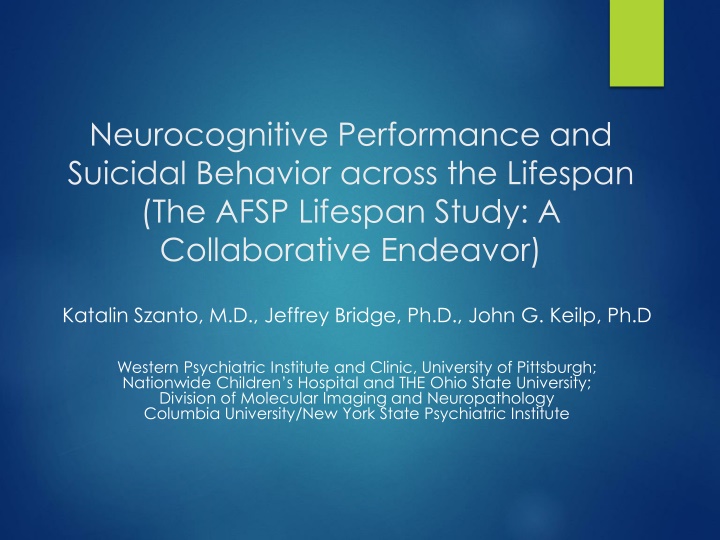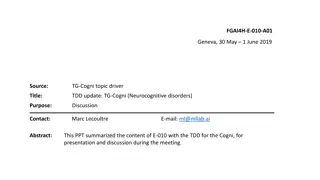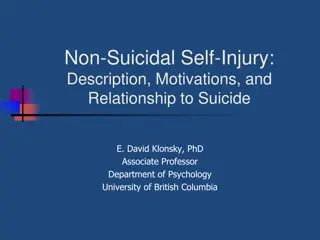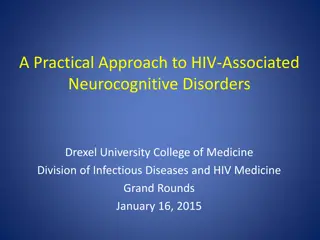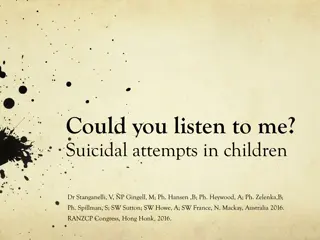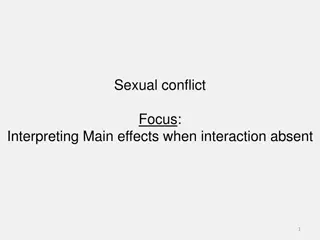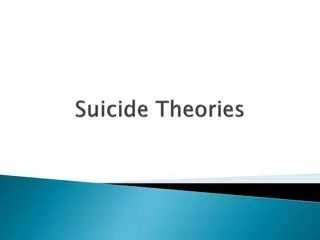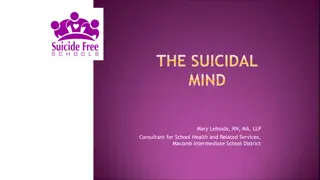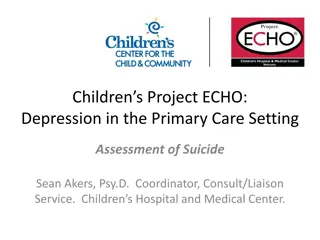Neurocognitive Performance and Suicidal Behavior: The AFSP Lifespan Study
This study by Dr. Katalin Szanto and Dr. Jeffrey Bridge explores the relationship between neurocognitive performance and suicidal behavior across various ages. It sheds light on the collaborative efforts involved in the AFSP Lifespan Study and the insights gained regarding this critical issue.
Download Presentation

Please find below an Image/Link to download the presentation.
The content on the website is provided AS IS for your information and personal use only. It may not be sold, licensed, or shared on other websites without obtaining consent from the author.If you encounter any issues during the download, it is possible that the publisher has removed the file from their server.
You are allowed to download the files provided on this website for personal or commercial use, subject to the condition that they are used lawfully. All files are the property of their respective owners.
The content on the website is provided AS IS for your information and personal use only. It may not be sold, licensed, or shared on other websites without obtaining consent from the author.
E N D
Presentation Transcript
Neurocognitive Performance and Suicidal Behavior across the Lifespan (The AFSP Lifespan Study: A Collaborative Endeavor) Katalin Szanto, M.D., Jeffrey Bridge, Ph.D., John G. Keilp, Ph.D Western Psychiatric Institute and Clinic, University of Pittsburgh; Nationwide Children s Hospital and THE Ohio State University; Division of Molecular Imaging and Neuropathology Columbia University/New York State Psychiatric Institute
Acknowledgement of Funding Source: American Foundation for Suicide Prevention (AFSP) Linked Standard Research Grant
Disclosure: Stock holdings in Pfizer, Inc. and Zoetis, Inc. (joint with spouse) No Conflicts of Interest with Material in this Presentation
Risk Factors for Suicidal Behavior Across the Lifespan: Traditional research has focused on suicidal behavior and suicidal behavior risk at distinct developmental periods (e.g. adolescence, adulthood, old age). Age changes represent a continuum (perhaps not linear, but continuous). Can we examine these in a single study? Impaired Neurocognition and disrupted Behavioral Performance are central, but often neglected aspects of suicidal behavior risk. Additional information not captured elsewhere. It is not only what those at risk for suicidal behavior are thinking, but how they are thinking that may confer increased risk for attempt.
Main Topics in Our Presentation: Age Effects on Risk Factors for Suicidal Behavior Neurocognitive Risk Factors for Suicidal Behavior
Aims of AFSP Lifespan Study: Assess neurocognitive dysfunction associated with suicidal behavior across the adult lifespan Are there neurocognitive correlates of suicidal behavior relevant at all ages throughout adulthood, or are certain deficits more pronounced at specific eras in adulthood? Determine if deficits at specific levels of neurocognition better discriminate individuals with past suicidal behavior, and if these deficits relate to one another Basic Information Processing Executive Functioning and Decision Making Psychological Content
AFSP Lifespan Study: Three Sites: Pittsburgh PA Columbus OH New York NY Three Groups: Depressed Past Suicide Attempters (most recent attempt within 5 years) Depressed without History of Suicidal Behavior Healthy Volunteers Age Range: 16 - 80 N=306 Enrolled
AFSP Lifespan Study/Clinical Risk Factors for Suicide Attempt: Clinical Dimensions Depression Severity Suicidal Ideation Hopelessness Borderline Personality Traits Impulsiveness, Aggressiveness Rumination Entrapment Social Problem Solving Mindful Attention Awareness
AFSP Lifespan Study/Domains: Basic Information Processing Attentional Control Memory Language Fluency Reaction Time, Processing Speed, Working Memory Executive Functioning and Decision Making Delay Discounting Reversal Learning Cambridge Gambling Task Psychological Content Implicit Association Task (Death/Suicide) Emotional Stroop Task
AFSP Lifespan Study/Talks Today: Kati Szanto Age Effects on Cognitive and Clinical Risk Factors Early vs. Late onset Suicide Attempt Jeff Bridge Age Effects on the Implicit Association Test (IAT) and its Discriminating Power across the Lifespan John Keilp Levels of Functioning Loss of Set and Deficient Processing Speed
